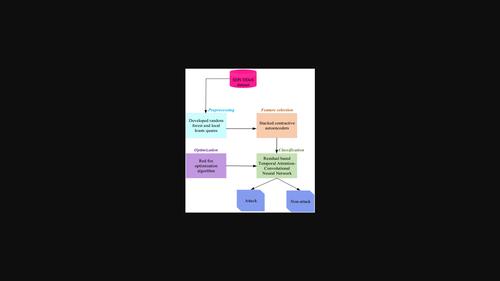当前位置:
X-MOL 学术
›
Int. J. Netw. Manag.
›
论文详情
Our official English website, www.x-mol.net, welcomes your feedback! (Note: you will need to create a separate account there.)
Residual based temporal attention convolutional neural network for detection of distributed denial of service attacks in software defined network integrated vehicular adhoc network
International Journal of Network Management ( IF 1.5 ) Pub Date : 2023-12-06 , DOI: 10.1002/nem.2256 V. Karthik 1 , R. Lakshmi 2 , Salini Abraham 3 , M. Ramkumar 1
International Journal of Network Management ( IF 1.5 ) Pub Date : 2023-12-06 , DOI: 10.1002/nem.2256 V. Karthik 1 , R. Lakshmi 2 , Salini Abraham 3 , M. Ramkumar 1
Affiliation

|
Software defined network (SDN) integrated vehicular ad hoc network (VANET) is a magnificent technique for smart transportation as it raises the efficiency, safety, manageability, and comfort of traffic. SDN-integrated VANET (SDN-int-VANET) has numerous benefits, but it is susceptible to threats like distributed denial of service (DDoS). Several methods were suggested for DDoS attack detection (AD), but the existing approaches to optimization have given a base for enhancing the parameters. An incorrect selection of parameters results in a poor performance and poor fit to the data. To overcome these issues, residual-based temporal attention red fox-convolutional neural network (RTARF-CNN) for detecting DDoS attacks in SDN-int-VANET is introduced in this manuscript. The input data is taken from the SDN DDoS attack dataset. For restoring redundancy and missing value, developed random forest and local least squares (DRFLLS) are applied. Then the important features are selected from the pre-processed data with the help of stacked contractive autoencoders (St-CAE), which reduces the processing time of the introduced method. The selected features are classified by residual-based temporal attention-convolutional neural network (RTA-CNN). The weight parameter of RTA-CNN is optimized with the help of red fox optimization (RFO) for better classification. The introduced method is implemented in the PYTHON platform. The RTARF-CNN attains 99.8% accuracy, 99.5% sensitivity, 99.80% precision, and 99.8% specificity. The effectiveness of the introduced technique is compared with the existing approaches.
中文翻译:

基于残差的时间注意力卷积神经网络,用于检测软件定义网络集成车载自组织网络中的分布式拒绝服务攻击
软件定义网络(SDN)集成车载自组织网络(VANET)是智能交通的一项伟大技术,因为它提高了交通的效率、安全性、可管理性和舒适性。SDN 集成 VANET (SDN-int-VANET) 有许多优点,但它容易受到分布式拒绝服务 (DDoS) 等威胁。针对 DDoS 攻击检测 (AD),提出了多种方法,但现有的优化方法已经为增强参数奠定了基础。参数选择不正确会导致性能不佳且数据拟合不佳。为了克服这些问题,本手稿引入了基于残差的时间注意力红狐卷积神经网络(RTARF-CNN),用于检测 SDN-int-VANET 中的 DDoS 攻击。输入数据取自 SDN DDoS 攻击数据集。为了恢复冗余和缺失值,应用了开发的随机森林和局部最小二乘法(DRFLLS)。然后借助堆叠收缩自动编码器(St-CAE)从预处理的数据中选择重要特征,从而减少了所引入方法的处理时间。所选特征通过基于残差的时间注意力卷积神经网络(RTA-CNN)进行分类。RTA-CNN 的权重参数借助红狐优化(RFO)进行优化,以实现更好的分类。所介绍的方法在PYTHON平台上实现。RTARF-CNN 的准确度为 99.8%,灵敏度为 99.5%,精确度为 99.80%,特异性为 99.8%。所引入技术的有效性与现有方法进行了比较。
更新日期:2023-12-10
中文翻译:

基于残差的时间注意力卷积神经网络,用于检测软件定义网络集成车载自组织网络中的分布式拒绝服务攻击
软件定义网络(SDN)集成车载自组织网络(VANET)是智能交通的一项伟大技术,因为它提高了交通的效率、安全性、可管理性和舒适性。SDN 集成 VANET (SDN-int-VANET) 有许多优点,但它容易受到分布式拒绝服务 (DDoS) 等威胁。针对 DDoS 攻击检测 (AD),提出了多种方法,但现有的优化方法已经为增强参数奠定了基础。参数选择不正确会导致性能不佳且数据拟合不佳。为了克服这些问题,本手稿引入了基于残差的时间注意力红狐卷积神经网络(RTARF-CNN),用于检测 SDN-int-VANET 中的 DDoS 攻击。输入数据取自 SDN DDoS 攻击数据集。为了恢复冗余和缺失值,应用了开发的随机森林和局部最小二乘法(DRFLLS)。然后借助堆叠收缩自动编码器(St-CAE)从预处理的数据中选择重要特征,从而减少了所引入方法的处理时间。所选特征通过基于残差的时间注意力卷积神经网络(RTA-CNN)进行分类。RTA-CNN 的权重参数借助红狐优化(RFO)进行优化,以实现更好的分类。所介绍的方法在PYTHON平台上实现。RTARF-CNN 的准确度为 99.8%,灵敏度为 99.5%,精确度为 99.80%,特异性为 99.8%。所引入技术的有效性与现有方法进行了比较。



























 京公网安备 11010802027423号
京公网安备 11010802027423号